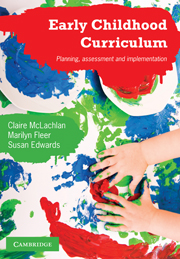Book contents
- Frontmatter
- Contents
- List of figures
- List of tables
- About the authors
- Acknowledgments
- Chapter 1 Introduction
- Chapter 2 Theory, research and the early childhood curriculum
- Chapter 3 Development and learning – how views of development shape how curriculum is framed
- Chapter 4 Curriculum as a cultural broker
- Chapter 5 Interpreting early childhood curriculum
- Chapter 6 Cultural-historical curriculum in action
- Chapter 7 Curriculum as a conceptual tool: Observation, content and programming
- Chapter 8 Assessing children and evaluating curriculum: Shifting lenses
- Chapter 9 Content knowledge: The sciences, maths and numeracy
- Chapter 10 Content knowledge: Language, literacy and ICT
- Chapter 11 Content knowledge: The arts and health, wellbeing and physical activity
- Chapter 12 Conclusions
- Index
Chapter 7 - Curriculum as a conceptual tool: Observation, content and programming
- Frontmatter
- Contents
- List of figures
- List of tables
- About the authors
- Acknowledgments
- Chapter 1 Introduction
- Chapter 2 Theory, research and the early childhood curriculum
- Chapter 3 Development and learning – how views of development shape how curriculum is framed
- Chapter 4 Curriculum as a cultural broker
- Chapter 5 Interpreting early childhood curriculum
- Chapter 6 Cultural-historical curriculum in action
- Chapter 7 Curriculum as a conceptual tool: Observation, content and programming
- Chapter 8 Assessing children and evaluating curriculum: Shifting lenses
- Chapter 9 Content knowledge: The sciences, maths and numeracy
- Chapter 10 Content knowledge: Language, literacy and ICT
- Chapter 11 Content knowledge: The arts and health, wellbeing and physical activity
- Chapter 12 Conclusions
- Index
Summary
This chapter will outline the relationship between observation, planning and content in early childhood curriculum. The role of relationships, transitions, environments and play as informants to observations, planning and content selection will be examined. These constructs will be analysed in the context of international research about the role of relationships, transitions and play in children's learning and development and the implications for how they shape curriculum.
LINKING OBSERVATION TO PLANNING IN THE CURRICULUM
REFLECTION 7.1
Kelly: I guess that's part of the curriculum design stuff, isn't it? That you work out what it is that you want children to be able to do and therefore you plan activities and work out in advance what you think they will achieve, so that you can assess whether or not it worked.
Kelly has articulated a particular model of assessment. Assessment is a way of finding out if what a teacher has organised for children to learn actually worked. She sees an important link between planning for teaching and what children do.
Graue and Walsh (1998) note that the process of ‘finding it out’ is particularly fraught with difficulty when it involves children:
Finding it out about children is exceptionally difficult – intellectually, physically, and emotionally. Physical, social, cognitive and political distances between the adult and the child make their relationship very different from the relationships among adults. In doing research with children, one never becomes a child. One remains a very definite and readily identifiable ‘other’ (p. xiv).
- Type
- Chapter
- Information
- Early Childhood CurriculumPlanning, Assessment, and Implementation, pp. 94 - 129Publisher: Cambridge University PressPrint publication year: 2010



